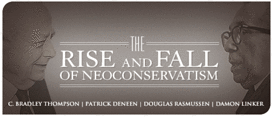A roundup of insightful commentary on this month’s issue.
Cato adjunct scholar Timothy Sandefur writes:
What’s good about the Straussians is their close and careful attention to the great works of philosophy—reading these works with the idea that they contain great and important truths, not merely historical influences. This is an inspiring thing, and it makes and encounter with Strauss’ students very powerful. I’ve learned a lot about philosophy from reading these works, and it would be a shame if hasty readers took Thompson and Brook’s book as an excuse to avoid careful and serious reading of these great works.
Nevertheless, the Straussian interpretations are at times unconvincing and even idiosyncratic. Take their bizarre notion that Plato’s Republic is a satire, rather than a defense, of totalitarian government. There’s really no evidence to support such an interpretation, and Thompson and Brook rightly point out that taking such a view requires one not only to disregard much about the text itself, but very important parts of the historical context. Somehow Aristotle didn’t get the joke. Somehow, neither did Dionysus of Syracuse. And the fact that Plato sticks to his basic message in other works—and that it has fascinating parallels in his epistemology, ethics, and metaphysics—are disregarded.
I’d like to hear Thompson… elaborate a bit on Jaffa’s relationship to the neoconservatism that he describes in his book. Jaffa does not reject the pro-freedom conservatism of Barry Goldwater; Jaffa wrote Goldwater’s famous “extremism in the defense of liberty” speech. Nor does he reject the Declaration of Independence, or advocate the intense collectivism advocated by the Progressives whom he and his followers denounce. In some ways, Jaffa’s defense of American institutions has made him an intense critic of neoconservatism. (And to their credit, the Claremont Review of Books positively reviewed the book.) Yet at the same time, he and his followers have advocated many of the anti-individualistic elements of neoconservatism that Thompson and Brook describe. It’s curious to me whether Thompson and Brook regard Jaffa’s interpretations of Strauss as accurate, or whether they regard him primarily as a critic and rebel against his teacher.
[To neoconservatives], war offers ubermeschen the enlarging opportunity to enrich the lives of their fellow citizens by treating them as pawns in a megalomaniacal game, “statesmanship”, we plebes couldn’t possibly understand…
I know. This sounds totally insane. But I’ve spent enough time in Washington wonkland, and I’ve read enough of the Straussian/neocon classics to say that, yes, this is a fair representation of what much of the neocon elite believes. They also believe the elite shouldn’t admit to believing this, so expect denial. But it’s true: there really are people who go on television and argue America should go to war against Libya at least in part to combat the imagined nihilism of modernity.
A blog calling itself Evidence of Control[1] writes:
Thompson pulls back from linking neoconservatism either to the practice of popular history or to fascism. I would do both: the national greatness, divine-right-of-executives view is exactly the view of popular historians, as evinced in the eternal recurrence of “historians rank the best president” polls; the view of fascism as starting with race-hate and devolving to permanent war-and-debt nationalism might well be an historical accident, as in the modern state cause and effect are more likely to run quite the other way.
For those of you who read French, Phillipe Silberzahn has an excellent discussion of Leo Strauss, Francis Fukuyama, and Karl Popper, illuminated by this month’s issue. It comes in the form of a reply to Professor Jacques Rollet — the latter having proposed, in Le Monde, that the recent Arab revolutions could prove the neoconservatives right after all. No, says Silberzahn, they most certainly were not right:
Neoconservatives wanted democracy in Iraq, or so we were told, but they brought it chaos, with hundreds of thousands dead, and that country is only barely getting back on its feet eight years later. They wanted security for the United States, but they weakened it financially, bleeding it white, and morally, launching it into not one but two wars from which it will take years to escape. They thought that democracy had to be imposed, while nations are quite capable of imposing it for themselves. They have not understood anything, and, as seen in the attempt at rehabilitation now underway… they have not learned anything, either.[2]
And finally, Jim May writes:
While neoconservatism and the literal fascists may be traveling different roads, their ultimate destination (as determined by their common root premise) is the same. All that differs is the scenery — and as the destination is approached, not even that. (That, by the way, is why the arguments over whether such as Jared Loughner or the Texas IRS plane crasher were “left” or “right” wing, are such a joke; the “scenery” of their writings would have been unremarkable in any of the following: Free Republic, Democratic Underground, the commenters at Zero Hedge, or the groupies of Lyndon Larouche and Ron Paul.) […]
[Conservatives fear] that looking back up the road would reveal that Americanism, far from being compatible with conservatism of any -eo prefix, was indeed the result of the Enlightenment they and the Left so loathe – while conservatism traces its origins to America’s original enemies: monarchy and the brutal religious feudalism of the pre-Enlightenment.
[1] A euphemism, the blogger says, for corpses.
[2] Translation by the editors.

